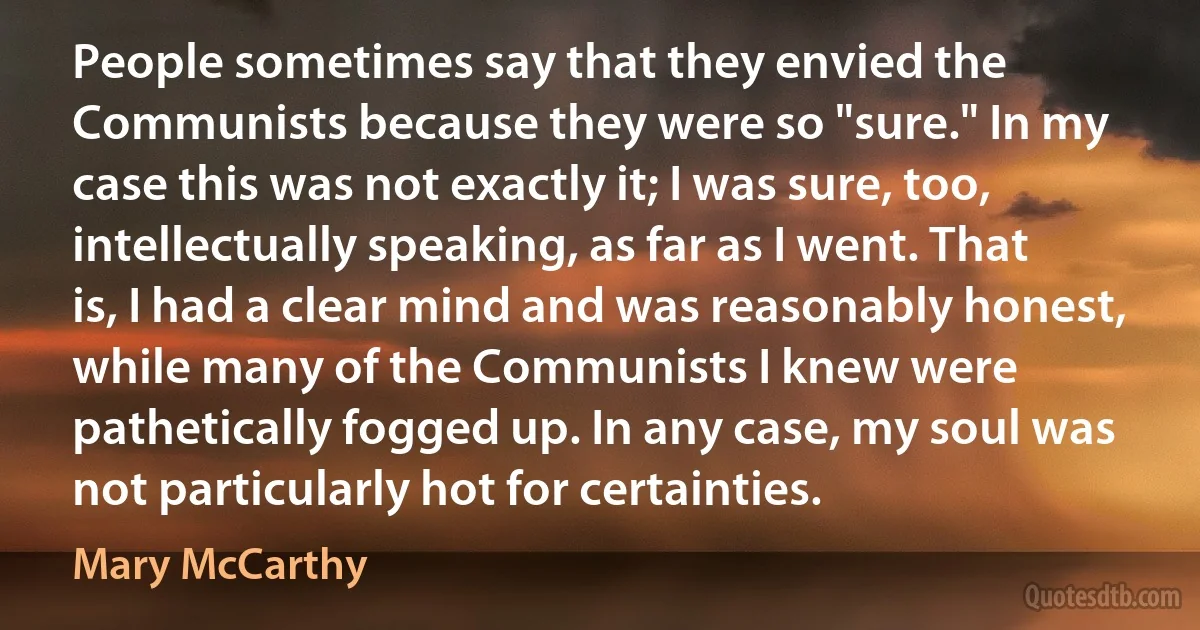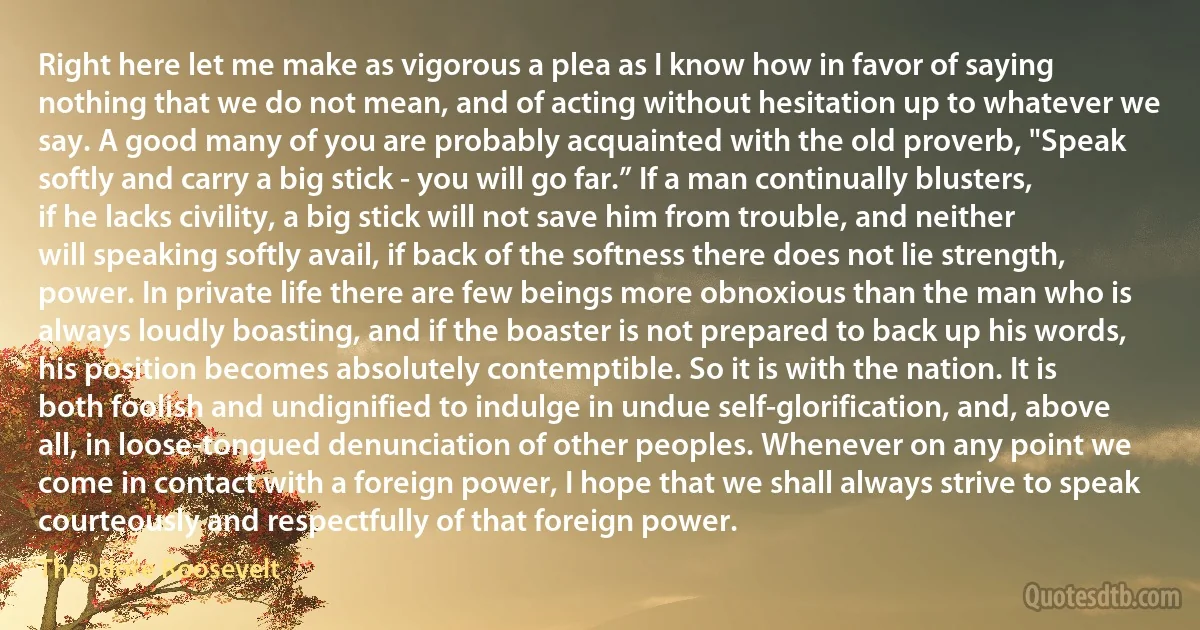Speaking Quotes - page 62
Speaking of an institution such as marriage as natural is, of course, paying it a compliment, the compliment of saying that it meets a fairly central human need. The fact that it is found in some form in every human society is in a way enough to show. But it might be thought that marriage became thus widespread only because it was, like adequate sanitation, a means to an end. This is pretty certainly what Hume thought, as evidenced by his very confused contrast of natural with artificial virtues. He regarded human sagacity simply as the power to calculate consequences, and counted chastity and fidelity, with justice, as artificial virtues, devices designed merely to produce safety and promote utility. In a species as emotionally interdependent as man this view of marriage is nonsense. Pair-formation could never have entered anybody's head as a device deliberately designated to promote utility.

Mary Midgley
It felt like a kidnap...and it rendered me mute for about nine months. I couldn't speak the language, and if I spoke English I was abused for it. It was quite a culture shock: brutal. I was so traumatised and afraid that I stopped speaking and my [birth] parents thought there was something wrong with me, thought I was possessed...

Adewale Akinnuoye-Agbaje
Perhaps you could tell me how many angels may stand on the point of a pin?”...
De Salcedo snorted. "I'll tell you. Philosophically speaking, you may put as many angels on a pinhead as you want to. Actually speaking, you may put only as many as there is room for. Enough of that. I'm interested in facts, not fancies.

Philip José Farmer
As I was climbing the narrow, rain-slicked lane - nearly three hundred years have gone by - I felt myself seized by the hand of a Powerful Friend [El Geco] and indeed I came to see myself lifted on the two enormous wings of Doménicos up to his skies which this time were full of orange trees and water speaking of the homeland.

El Greco
...what I've learned about it throughout the years is that it's my way of giving voice to the often voiceless; I write mostly about the sort of people on the opposite end of flush, and so when I hear them speak in this kinda jagged form of poetry, it moves me in a way I can't even really describe. Technically speaking, some actors sing it beautifully, others can't wrap their minds around it.

Matthew Paul Olmos
"Telling the truth”-which for so long was itself a problematic exercise thanks to competing "truths” and the cost of airing them publicly-now became a virtue in itself. And the bigger the truth you have to tell, the greater your claim upon the attention of fellow citizens and sympathetic observers. Thus, despite the obvious risk of appearing to compete with the ultimate truth of Jewish genocide, speaking openly about hitherto uncomfortable episodes in the recent German past opens the possibility of encouraging the telling of many stories.

Tony Judt
Broadly speaking, the city of the future will not bring to its center any goods not intended for use or consumption therein. At Chicago 66% of the tonnage in and out is not for home use, but for distribution to other places. In view of this fact we designed a general freight scheems for the entire city's use, with car yards, freight depots and warehouses combined, eight miles from the city, where all trains shall unload and reload. [...] I believe that such a course would be economical both for the public service companies and the city government; certainly it would prolong the life of the street paving and eliminate congestion and a constant source of dirty and disorder. Can it be doubted that the city of the future will operate its cental street system, possibly all its streets, in this manner?

Daniel Burnham
In the years between our defeat in 1979 and our defeat in 1983 Labour was increasingly seen to be a party slipping towards impossiblism, succumbing to fads, riven by vicious divisions, speaking the language of sloganised dogma – and usually voicing it in the accents of menace. It was almost as if sections of the party measured the purity of their socialism by the distance which they could put between it and the minds of the British people.

Neil Kinnock
Men may make laws to hinder and fetter the ballot, but men cannot make laws that will bind or retard the growth of manhood.
We went into slavery a piece of property; we came out American citizens. We went into slavery pagans; we came out Christians. We went into slavery without a language; we came out speaking the proud Anglo-Saxon tongue. We went into slavery with slave chains clanking about our wrists; we came out with the American ballot in our hands.
Progress, progress is the law of nature; under God it shall be our eternal guiding star.

Booker T. Washington
We have no right to believe a thing true because everybody says so unless there are good grounds for believing that some one person at least has the means of knowing what is true, and is speaking the truth so far as he knows it. However many nations and generations of men are brought into the witness-box they cannot testify to anything which they do not know. Every man who has accepted the statement from somebody else, without himself testing and verifying it, is out of court; his word is worth nothing at all. And when we get back at last to the true birth and beginning of the statement, two serious questions must be disposed of in regard to him who first made it: was he mistaken in thinking that he knew about this matter, or was he lying?

William Kingdon Clifford
Often Powell's audiences felt that he was speaking liturgically, when he touched on the subject of England. And they were right. In elucidating the idea of sovereignty, Powell invokes "the Crown in council, the Crown in Parliament and the Crown in judgement", blessing the existing institutions with names that repeat their magic without explaining it. When, in his famous St George's Day speech, he allows himself the use of purple prose...it is in order to emphasise the mystery of England. The "real presence" in the heart of politics of that inexplicable thing called the Crown, the very thing over which Shakespeare puzzled in his history plays.

Enoch Powell
For those who saw and heard Enoch Powell, the memory is indelible – the black moustache, the burning eyes, the hypnotic, metallic voice, the precision of language, the agility in debate. These will be largely lost to future generations. But, in a more important respect, Powell will survive more surely than any other British politician of the 20th century except Winston Churchill. His speeches and writings will be read so long as there exists a political and parliamentary culture in which speaking and writing matter. And if there comes a time when such a culture is all but destroyed, those brave few who wish to restore it will find in the thoughts of Enoch Powell something approaching their Bible.

Enoch Powell
During the years Hardie was in Parliament, from 1892 to 1895...he made the subject of unemployment an issue in British politics. Before then the State acknowledged no obligation to make provision for the unemployed. They were regarded as being in the main a lot of drunken, thriftless, ne'er-do-wells whose condition was due to their own fault. By persistently keeping the unemployed question before Parliament, and by speaking at week-ends throughout the country, Hardie at last succeeded in getting the Government to admit a public responsibility for the unemployed. To Keir Hardie, more than to any other man, the credit was due for the great change which, in the last 30 years, had come over Parliament, and the awakening of the public conscience on this question.

Keir Hardie
[Nineteen Eighty-Four] was based chiefly on communism, because that is the dominant form of totalitarianism, but I was trying chiefly to imagine what communism would be like if it were firmly rooted in the English speaking countries, and was no longer a mere extension of the Russian Foreign Office.

George Orwell
Strictly speaking, as a Nationalist, he was an enemy, but since in every crisis he would exert himself to prevent violence - which, from the British point of view, meant preventing any effective action whatever - he could be regarded as "our man." In private this was sometimes cynically admitted. The attitude of the Indian millionaires was similar. Gandhi called upon them to repent, and naturally they preferred him to the Socialists and Communists who, given the chance, would actually have taken their money away. How reliable such calculations are in the long run is doubtful; as Gandhi himself says, "in the end deceivers deceive only themselves"; but at any rate the gentleness with which he was nearly always handled was due partly to the feeling that he was useful.

George Orwell
The will of the nation, speaking with the voice of battle and through the amended Constitution, has fulfilled the great promise of 1776 by proclaiming 'liberty throughout the land to all the inhabitants thereof.' The elevation of the negro race from slavery to the full rights of citizenship is the most important political change we have known since the adoption of the Constitution of 1787. NO thoughtful man can fail to appreciate its beneficent effect upon our institutions and people. It has freed us from the perpetual danger of war and dissolution. It has added immensely to the moral and industrial forces of our people. It has liberated the master as well as the slave from a relation which wronged and enfeebled both. It has surrendered to their own guardianship the manhood of more than 5,000,000 people, and has opened to each one of them a career of freedom and usefulness.

James A. Garfield
I care nothing for creeds. I am not concerned with any one's religious belief. But I would have men think for themselves. If we do not, we can only abandon one superstition to take up another, and it may be a worse one. It is as bad for a man to think that he can know nothing as to think he knows all. There are things which it is given to all possessing reason to know, if they will but use that reason. And some things it may be there are, that - as was said by one whom the learning of the time sneered at, and the high priests persecuted, and polite society, speaking through the voice of those who knew not what they did, crucified - are hidden from the wise and prudent and revealed unto babes.

Henry George
Speaking generally, he holds dominion, to whom are entrusted by common consent affairs of state - such as the laying down, interpretation, and abrogation of laws, the fortification of cities, deciding on war and peace, &c. But if this charge belong to a council, composed of the general multitude, then the dominion is called a democracy; if the council be composed of certain chosen persons, then it is an aristocracy ; and, if, lastly, the care of affairs of state, and, consequently, the dominion rest with one man, then it has the name of monarchy.

Baruch Spinoza



